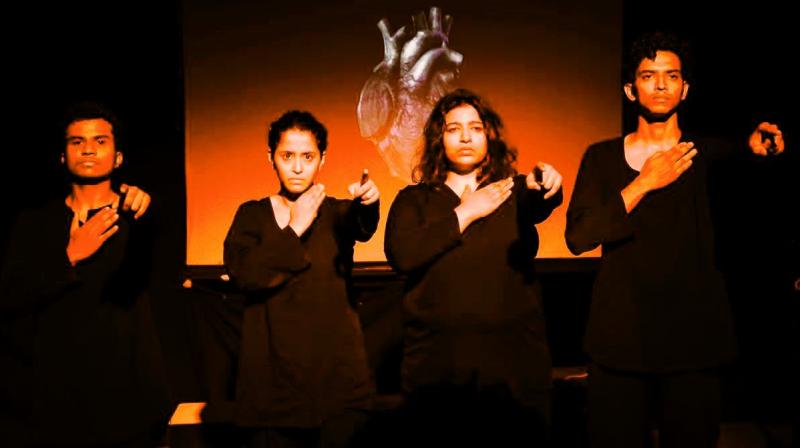Bring on the drama!
On the occasion of World Theatre Day, some of Hyderabad’s leading theatre groups discuss how theatre can be made more inclusive.

Can a city without a NSD or Prithvi Theatre flourish as well? In every theatre based conversation, be it over tea in Lamakaan’s verandah or Ravindra Bharati’s canteen, people often unanimously agree that Hyderabad has not reached anywhere close to New Delhi or Mumbai in terms of involvement, accessibility or even performances, despite the fact that some of the city’s most well-established theatre groups are decades old.
While New Delhi has inculcated and harnessed the theatre culture heavily from college groups, dramatics societies and their nukkad nataks that leave you with goose bumps, Hyderabad’s youth still seems to be unaware of what theatre has to offer and the few venues in the city witness only a very select elite crowd that has not changed much over the years.
On the occasion of World Theatre Day, some of Hyderabad’s leading theatre groups discuss how theatre can be made more inclusive while learning from the challenges that they face.
Vinay Verma of Sutradhar
Taking a very traditional approach, the veteran theatre practitioner who has led Sutradhar for over 20 years now, says that there is no Utopian way to make theatre accessible. “The only way to reach out to your audience is to constantly do theatre, direct plays and perform them. There is no shortcut,” says Verma, who will soon be performing the famed White Rabbit, Red Rabbit by Nassim Soleimanpour — a play that does not have a set or a director, just a script that is given to the performer with no rehearsal time. The play was written by Nassim, an Iranian writer banned from leaving his country, and unlike most plays, the audience is encouraged to keep their phones on, take pictures and notes that are then sent to the playwright after the production. While the play has been performed in the city twice before in English, Vinay Verma plans on doing it completely in Hindi.
Rathna Shekar of Samahaara
Samahaara’s founder, Rathna Shekar thinks it is important to break the linguistic stronghold that English and Hindi have over city’s theatre. “Our next goal is to work with Telugu plays. We are starting off with smaller productions to get our actors comfortable, the goal for this year is to focus on bigger Telugu productions. We want to tap into the uncharted Telugu audience that we are missing out on,” states Rathna Shekar.
Preksha Trivedi of Coliseum
The new kid on the block, Coliseum, founded by Preksha Trivedi and Dwij, made quite a name for itself with their biggest production Shamus — a houseful show at Ravindra Bharati last year. “Our aim has always been to provide and engage Indian theatre consumers with global content that they can watch in their cities. We want to work around big Broadway-like productions so that the average Indian won’t have to travel all the way to New York or London to experience that. We want to bring that bigger-than-life international feel to the local venues. We have also vowed to not have shows on weekends as the usual practice goes. We believe if people can go watch a movie on Thursday, they can surely make time for good theatre on a Thursday too,” explains Preksha.
R.K. Shenoy of Dramanon
Dramanon’s Hyderabad chapter has been lauded for their path-breaking concepts to make theatre more accessible. Not only do they hold theatre workshops but they also give the attendees a chance to perform in a production play that is directed by Dramanon members. However, R.K. Shenoy does point out the need for better infrastructure. “Theatre practitioners are always evolving and rediscovering new ways to express themselves while wanting the audience to have varied experiences. There are always different stories to tell or to tell the same stories differently. But to have an impactful performance, Hyderabad still needs a dedicated venue, designed to theatre performances. Till then, it’s a struggle to get people to wa-tch theatre especially when we are competing not only with cinema but also with other forms of online entertainment,” he says.
Ankit Bakshi of Break a Leg!
While Break a Leg! is not a theatre group, it was formed by Ankit Bakshi primarily to make theatre inclusive and accessible. “Break a Leg! was started with a simple thought of leveraging the Internet to promote theatre. The digital world has done wonders for music, dance and stand-up comedy. So why should theatre be left behind? With that thought, we started to create engaging video content including video interviews, play trailers, micro-documentaries and a lot more. It helps present the ‘behind-the-stage’ elements of theatre and makes the audience realise the kind of work that goes into creating a play. We are now also presenting unique theatre experiences that are different from conventional plays,” explains Bakshi.

